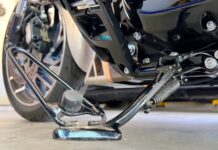I was in a hotel room in Saint John, New Brunswick, Canada, trying to get some sleep for an early wake-up call. Seven of us had ridden here from New York City and the next morning we’d planned to take the early ferry to Digby, Nova Scotia, for the Wharf Rat Rally. The room was beautifully appointed and the bedding incredibly comfy, but the problem was that my roommate snored. And we’re not talking the usual snorting, buzzing and whistling. This was more like a foghorn on an ocean liner. Every few minutes I’d exclaim, “You’re snoring!” She’d mumble something, turn over and all would be quiet… for about five minutes when the full-out aural assault would begin again. Eventually I couldn’t take it anymore and finally whipped my head around, shot bolt upright and screamed, “I can’t stand it! Shut up!”
All of a sudden, the room started to tilt and spin as if I was on a carnival ride, and I knew I was in trouble. It was my old friend vertigo come to pay me a visit. For those of you who have never experienced this dread disorder, the closest I can liken it to is what we used to call spinning out—when you were drunk out of your mind, lay down and tried to pass out, but instead the room started spinning so violently that you were sure you’d fall out of bed if you let go of your death grip on the mattress.
My first bout of vertigo came about 10 years ago. I was in bed that time, as well, when the room started spinning violently, and not just in one direction. I had several episodes that night, and the whole experience scared me half to death. It was truly debilitating, and I could barely keep my balance to walk—or, really, crawl—to the bathroom and back. Forget about food. The nausea was overwhelming.
I made an appointment with a neurologist (I thought I had some kind of brain disorder!), and he ordered a bunch of tests and sent me home with a prescription to counteract the dizziness. It made my head fuzzy and I looked like I was drunk when I tried to walk. I horrified the staff at the motorcycle shop where I worked by falling down the steps there. None of this stopped me from going on a run my motorcycle club had scheduled. I rode to Newark and parked at our appointed meet spot. The president of the club watched me walk unsteadily across the parking lot and smack into the door jamb of Mickey D’s. He shook his head and said, “You’re not going anywhere. We’ll take care of your bike and get you home.” I protested weakly but I was relieved that I didn’t have to ride because I could barely keep the Sportster upright when I had to stop for a traffic light.
The next day I visited an otolaryngologist (ear, nose and throat doctor) who diagnosed benign paroxysmal positional vertigo (BPPV) which is often caused by abrupt changes in head or body position, especially with side-to-side movements, and exacerbated by stress and lack of sleep. He told me to throw away the drugs I’d been prescribed, and only then did I begin my recovery. It was six weeks before I felt like I could get on a motorcycle again.
I had a few minor episodes in the years following, but those didn’t last long. This most recent one really kicked my butt. In the morning when everyone was preparing to leave, I couldn’t even get out of bed, much less deal with riding a ferry across the rollicking Bay of Fundy. There was a lot of concern mixed with consternation. The group didn’t want to leave me behind—bikers don’t do that to their buddies—but I insisted that they go on, that I was safe in the hotel and I’d try to meet them in Digby the next day.
Well, the next day came, and the next day and the next, and it took everything I had just to walk the few hundred feet to the steakhouse across the lot, grab something to eat and go back to my room. I couldn’t read—it made me nauseous. I watched TV, tried some over-the-counter remedies and slept. A lot. The staff at the Hampton Inn was helpful and sympathetic, doing what they could to help ease my distress, which by this time was psychological as well as physical. At the time, it seemed like the worst place imaginable to be hit with vertigo—in another country 650 miles from home. I was sure I wouldn’t be able to ride anytime soon. I had nightmares about having to abandon my bike and fly home. Wait a minute—fly? In this condition? I think not.
The morning of the fifth day I received a call from some of the guys who’d gone on to Digby. They were ready to head home, and wanted to know if I wanted to ride with them. I knew I couldn’t stay at the Hampton Inn forever, and I gratefully accepted their offer, figuring if I lost my balance and fell off my bike and onto the highway, they’d at least be able to keep my body from being run over.
I packed to leave, shaking the entire time—not with vertigo symptoms, but with fear. They helped me load everything on the bike and we saddled up and took off. And the vertigo disappeared. I was stunned. We stopped for gas about an hour and a half later and when I put my feet down, the imbalance and dizziness came back. But it eased as soon as we started rolling again. The guys split off somewhere in New England and I rode solo for another hour or two, found a motel room for the night, had a good dinner and slept like a baby.
The next morning, I felt much better than I had in days. I actually enjoyed the 200-mile trip home from the motel, and I was no longer afraid of falling off my bike or having another attack while riding. Ever since I got home, I pondered the reason for my miraculous recovery—as long as I was rolling along on my bike, that is. It was suggested to me that the forward motion counteracted the effects of the BPPV, but I think it’s something else… something intangible. I believe it’s just one of those mystical things that happen when I’m on a motorcycle. It’s why I ride.



















